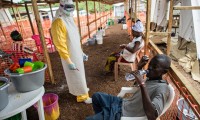 The Ebola outbreak not only exposed major weaknesses in Sierra Leone’s health system but revealed ‘blind spots’ in over ten years’ of international aid programming to the West African nation, according to a major new report launched today by the Overseas Development Institute (ODI).
The Ebola outbreak not only exposed major weaknesses in Sierra Leone’s health system but revealed ‘blind spots’ in over ten years’ of international aid programming to the West African nation, according to a major new report launched today by the Overseas Development Institute (ODI).
Despite $360 million of international aid channelled into building and strengthening Sierra Leone’s health system since 2002, the report from the UK’s leading think tank on international development issues, found that well before the Ebola outbreak there was a weak health system that lacked citizen trust, as well as some basic supplies like medicines, ambulances and rubber gloves.
Building the capacity of health systems has been a key focus of donor support but has suffered from multiple ‘blind spots’ says the report, resulting in a system ill-prepared to deal with the Ebola outbreak – due to the shortage of trained medical staff an additional 21,000 medical staff had to be recruited to fight Ebola.
The report also says that the national government had failed to commit sufficient funds to its health sector or put in place effective systems for local, district and national governments to work together.
Approximately 11,000 people died from Ebola over the last year, almost 4,000 in Sierra Leone.
Early analysis by the Government of Sierra Leone suggests that Ebola has caused Sierra Leone’s child mortality rate to increase from 161 per 1000 to 181 per 1000 for children under the age of five.
But it is not just Ebola itself that is leaving the Sierra Leonean population fatally exposed.
National immunisation days have been cancelled because of the outbreak, leaving thousands of children exposed to potential outbreaks of polio and measles. Women have also been deterred from attending antenatal visits or giving birth in health centres for fear of getting Ebola, says the report, titled ‘After Ebola: Why and how capacity support to Sierra Leone’s health sector needs to change’.
There is also a reported increase in teenage pregnancies as a result of school closures.
“Aid has played an important role in development progress in Sierra Leone over the last 13 years with some important health advancements, but our research over the last two years has found that gaps in Sierra Leone’s health system were longstanding in nature, and must be addressed by both the government and international donors, otherwise the country will be at the mercy of the next health crisis,” said report author Lisa Denney.
Capacity building to the health sector needs to become smarter argues the report, with rebuilding efforts staying well clear of an emergency mindset that places Ebola at the centre of the problem.
The findings will be discussed at a public meeting in London on Friday – with the Sierra Leone high commissioner as one of the speakers.
Register here to attend or watch online – http://www.odi.org/events/4228-ebola-humanitarian-development-sierra-leone-social-mobilisation-aid-msf
Ends
To request a copy of the report or to interview the authors Lisa Denney and/or Richard Mallett please contact Miles Barter on 07808 791265 or email m.barter@odi.org.uk


Be the first to comment